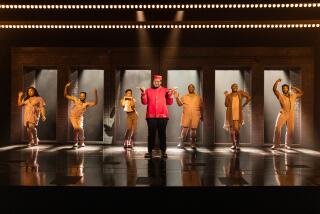MUSIC REVIEW : Baritone Hampson Offers Elegant Recital
- Share via
The best vocal recitals are small miracles of organization, design, delivery and response--each element meshing with and supporting the others. Thomas Hampson gave such a recital--en route to taking it to Alice Tully Hall in New York City this weekend--on Wednesday night at USC. His partner in miracles was pianist Armen Guzelimian.
The spectacularly gifted and accomplished American baritone has done it before. Four years into his European operatic apprenticeship in 1985, Hampson returned to North America for a recital tour, during which he appeared at Ambassador Auditorium.
This spring, in a period when his operatic career seems to be in high gear, Hampson apparently thinks nothing of interrupting those high-paying stage engagements for some soul-satisfying recitals. What he satisfied a crowd of connoisseurs with was a program of songs, a “Liederabend,” actually, by Haydn, Meyerbeer, Debussy, Schoenberg, Mahler, Brahms and Richard Strauss.
Meyerbeer? For those many of us who have never heard a song by the great German composer of French opera, the news is that Giacomo Meyerbeer wrote more than 130 of them, in German and French.
Hampson sang four, all gems: the bitter/vulnerable “Menschenfeindlich”; the stoic “Die Rose, die Lilie, die Taube, die Sonne”; the seductive “Komm, du schones Fischermadchen,” and the narrative “Le poete mourant”--making of each a dramatic or lyric moment of sharp definition.
He colored the voice without limiting its purely vocal expressivity, inflected the text tellingly but without exaggeration and kept the musical line intact. Guzelimian partnered from similar resources of technique, depth and understanding.
The climactic part in the second half of this recital involved songs on texts from “Des Knaben Wunderhorn”--five by Mahler, two by Brahms and two by Strauss. The 32-year-old singer, with a voice strong and expressive at both ends of the dynamic spectrum, delivered these deceptively simple poems in a manner straightforward and multilayered, giving the words all their outer and subtextual resonances.
And, when he stormed the heights, emotional and vocal, of “Zu Strassburg auf der Schanz” and “Scheiden und Meiden,” he did so with full, overwhelming power but no hint of forcing.
No less potent were the three preceding songs by Schoenberg, “Gruss in die Ferne,” “Erwartung” and “Wie Georg von Frundsberg von sich selber sang”--the last one also another “Knaben Wunderhorn” text. Though using scores here, Hampson nevertheless indicated the scope and inner workings of these kaleidoscopic, post-Wagnerian pieces.
The evening began with four songs by Haydn, splendorous examples of Hampson’s polished technique and pungent word-sensitivity. The pre-intermission set was Debussy’s “Trois Ballades de Francois Villon,” given, by singer and pianist, the full range of Gallic character.
At the end, Hampson offered his appreciative listeners two encores by Richard Strauss: “Das Rosenband” and “Abschied “.
More to Read
The biggest entertainment stories
Get our big stories about Hollywood, film, television, music, arts, culture and more right in your inbox as soon as they publish.
You may occasionally receive promotional content from the Los Angeles Times.










